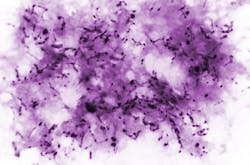NIH describes 2019 as “banner year” in addressing TB
Several promising developments occurred in tuberculosis (TB) research in 2019, addressing both therapeutic regimens and preventive approaches, National Institute of Allergy and Infectious Diseases (NIAID) Director Anthony S. Fauci, M.D., and other Institute officials summarize recent progress in an article in The Journal of Infectious Diseases.
In September 2018, NIAID, part of the National Institutes of Health (NIH), issued its Strategic Plan for Tuberculosis Research, which outlined research priorities to reduce and ultimately end the burden of TB, which has claimed the lives of more than a billion people in the last two centuries.
Therapeutics trials described by the NIAID authors include BRIEF TB/A5279, a Phase 3 clinical study demonstrating that a one-month course of two antibiotic drugs worked as well as a nine-month regimen of a single drug to prevent TB disease among adults and adolescents with HIV at risk of developing active TB.
In June 2019, NIAID and the Eunice Kennedy Shriver National Institute of Child Health and Human Development, also part of NIH, launched the Phase 3 PHOENIx MDR-TB trial in 12 countries. PHOENIx MDR-TB (Protecting Households on Exposure to Newly Diagnosed Index Multidrug-Resistant Tuberculosis Patients) will compare two oral regimens for preventing active TB in adults, teens and children who are at high risk of infection because they live with adults who have multidrug-resistant TB.
Advances in TB vaccine development in 2019 included preclinical and clinical results. A study in macaques, in which the Bacille Calmette-Guerin (BCG) vaccine — the world’s only licensed TB vaccine — was administered intravenously (IV) instead of by the standard intradermal route resulted in a dramatic increase in efficacy. The findings support further investigation of IV BCG administration in future human clinical trials.
The authors also described results of a Phase 2b trial of a candidate TB vaccine M72/AS01 (developed by GlaxoSmithKline) as “groundbreaking.” The trial enrolled 3,575 volunteers in three countries and demonstrated 50 percent efficacy in preventing development of active pulmonary TB compared with placebo.

